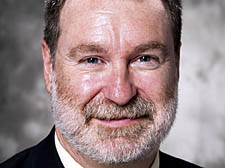|
|
 |
| |

Andrew Way |
IT crisis Royal Free boss quits hospital for Oz
Chief hit by computer nightmare leaves
THE chief executive of the Royal Free Hospital has resigned just months after describing his battle with a misfiring computer system as the “toughest days of my career”.
Andrew Way told staff at the world-famous teaching hospital in Pond Street, Hampstead, of his decision to leave the hot-seat on Friday afternoon.
The chaotic installation of the Cerner Millennium patient records system, which has led to hundreds of missed appointments during the past 12 months, cost the Royal Free £10million.
One of Mr Way’s final tasks will be to provide the board with a report on how the hospital can operate in the recession.
He will advise senior colleagues at a meeting today (Thursday) that funding is likely to be at its lowest ebb and is set to suggest a fire-sale of hospital-owned sites to ease the financial pain. They include the empty Coppett’s Wood Hospital in Haringey, Queen Mary’s House in East Heath Road and ward space at the Royal National Throat, Nose and Ear Hospital in Gray’s Inn Road.
Mr Way’s report also suggests property developers could be sold space in the car park if they were interested in building flats. All hospitals are fearing government cuts to funding later this year and Mr Way warned that the Royal Free will have “substantially less income over the next two years”. It will not be Mr Way, however, who leads the hospital through what he calls the “changing economic climate”. He confirmed on Monday that he is to quit the hospital for a new job in Australia with the Alfred Health Group – a collection of hospitals in Melbourne which recently played a prime role in helping patients hit by a heatwave.
He will be hoping for a smoother ride than his four-and-a-half years in charge of the Royal Free, which has seen him forced into axing jobs and then dealing with the Cerner crisis.
Mr Way was at his most candid during a radio interview in February when he said: “I have had more doctors and nurses talk to me about how terrible they feel for providing such a poor service to their patients over the last six months than in my whole career in the NHS. I’ve had some of the toughest days of my career around this.”
Close colleagues suggested the blame for the catastrophic switchover should not be fixed on Mr Way personally and there is a feeling among the hospital’s top brass that they were just unfortunate to be a “guinea pig” in a wider drive to introduce more technology.
There is more frustration in the hospital’s stuttering attempts to gain Foundation status, which would allow it to manage its own financial affairs without government interference.
With his affable nature, Mr Way is not thought to have made many enemies in the boardroom, even if eyebrows were raised when the hospital’s computers seemed to be suffering more bugs than the patients.
Lower down the hierarchy, some medical staff are known to have been left feeling weary with their bosses over the faltering system and sources suggested they were not surprised at the prospect of a change at the top.
But Mr Way said: “It has always been a personal ambition, should the opportunity arise, to work and experience healthcare in another country. When the opportunity came earlier this year to go to the other side of the world to run a major healthcare provider, I decided to take it.” |
 |
|
|
 |
| |
| |
|
 |
|